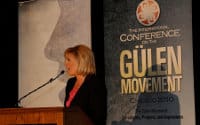 Last week I started writing about the International Conference on the Gulen Movement held in Chicago, titled “The Gulen Movement: Paradigms, Projects and Aspirations,” and promised to continue this week.
Last week I started writing about the International Conference on the Gulen Movement held in Chicago, titled “The Gulen Movement: Paradigms, Projects and Aspirations,” and promised to continue this week.
On the second day of the conference, the first panel was titled “Sociological Approaches to the Hizmet Movement” and the speakers were Suveyda Karakaya of the University of Tennessee, Gökhan Bacık of Zirve University, and Muhammed Çetin of East Stroudsburg University.
Karakaya’s paper “Women in the Hizmet Movement: Traditionalists or Modernists?” examines the attitudes of 250 women affiliates from diverse backgrounds — residing in Turkey and the US — regarding controversial issues such as women’s access to higher education and employment, dress styles (including the headscarf) and their roles in the movement. She concludes that these women cannot be classified as wholly traditionalist or modernist. Furthermore, she claims that rather than religion, educational background is the decisive element for determining if a woman is more traditionalist or modernist.
Bacık’s paper is titled “Islamic Movements and Amodern Networks.” This study of the Gulen movement details how new faith-based movements operate in daily life and how they activate traditional informal networks. Bacık argues that the micro-universe offered by the Gulen movement is an important sample in analyzing how new faith-based movements develop their mobilization strategies over daily life. Unlike Islamist movements, the agency of change is not government but daily life. The movement also displays an irregular position towards modernity and in this sense it is neither modern nor anti-modern, but “amodern.” The employment of traditional networks in daily life has released the movement from the burden of modernity. Being indifferent to the state and operating through daily life, the movement has gained a potential for connecting with the historical Islam that has its roots in pre- modernity.
Çetin talked about the civic engagement element of the movement, as well as its efficacy and success.
In the second panel of the day, titled “Modern Social Paradigms and the Hizmet Movement,” the speakers were Simon Robinson of Leeds Metropolitan University, Leonid Sykiainen of the State Scientific University of Russia and Jeremy Walton of New York University. Robinson gave a presentation on multiculturalism and the ethics of diversity in Fethullah Gulen‘s thought. Robinson argues that in stressing universal responsibility and stewardship Fethullah Gulen provides much firmer psychological and ethical, as well as theoretical and practical, bases for multiculturalism and ethics of diversity than either human rights or the rule of law. Sykiainen discussed the role of Gülen’s ideas for the Muslim world and their potential impact on democratic reforms. He argues that Gülen’s ideas are important for using the positive results of globalization and avoiding its negative impacts on the Muslim world in the light of different positions of modern Islamic legal and political thought. The title of Walton’s paper is “Toward a Comprehensive Interpretation of Piety and Civility: Theological, Ethical, Institutional and Aesthetic Dimensions of the Hizmet Movement.” He argues that the theological and social aspects of the movement should not be analytically separated, as they inform each other and therefore demand a synthetic and comprehensive approach.
